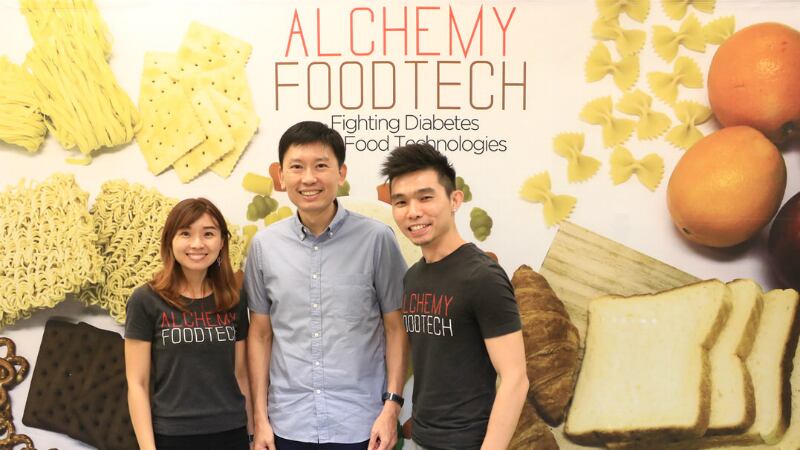Alchemy raised S$2.5m (US$1.8m) in funds through its pre-series A round last year, much of which has gone into the opening of its food tech laboratory, Cooklab@Alchemy.
"Cooklab@Alchemy enables application work, and is equipped with biochemistry capabilities to conduct research on digestion rates and texture analysis," said Alchemy Foodtech CEO and co-founder Alan Phua at the lab's official launch ceremony.
The lab comprises two parts: A food lab to develop Alchemy’s GI-lowering ingredient blends (including its keynote invention, additive 5ibrePlus), and a biochemistry lab.
Phua also announced at the event that Alchemy has signed LOIs with over 20 local and international companies. These include Gardenia Bread, Lim Kee Pau, Tan Seng Kee (Kang Kang Noodles), and Hans Café and Cake House.
“[There] will be pilot launches with some food partners later this year. Mass manufacturing will follow after. The timeline determinant now is internal production operations,” Phua told FoodNavigator-Asia.
“Alchemy will be analysing and optimising [our] blend for each partners’ recipe.
“We will work closely [to] incorporate 5ibrePlus into their products to create a lower GI variant without altering the taste, colour or texture of the original product.”
A main drawing point of the functional ingredient is that manufacturers’ original formulae and processes can remain vastly similar to the originals even after adopting it for use, which means that no new equipment would be required.
“5ibrePlus can just be added to a manufacturer’s regular production process, using the same production line and equipment,” said Phua.
“It was part of our solution design from the beginning. Requiring new production line and equipment means additional CAPEX, which always hinders adoption.”
5ibrePlus and its vast potential
According to Phua, 5ibrePlus is natural, gluten-free and vegan, making it ‘an ideal functional ingredient for carbohydrate-rich foods’.
The functional ingredient is currently available in either powder or grain form.
“It can also be applied to processed carbohydrate staples (including kuay teow, bee hoon, bread, noodles etc.),” Phua said.
“[We] simply substitute a small portion of the flour. The rest of the formula and process typically is left unchanged.”
Importantly, it is highly likely that products treated with 5ibrePlus will be as economically viable for the public as regular ones.
“The current estimate is that rice with 5ibrePlus will cost similar as brown rice,” said Phua.
“We are turning several levers to help with costing. Economies of scale is one. Furthering research into other plant compounds we can use to increase efficacy is also another.”
When asked how low the GI values could potentially reach in products, he added that: “The reduction is dosage dependent and so the reduction is dependent on what our food manufacturing partners want to achieve.”
In its experiments with rice, Alchemy has found that a 9% replacement of raw rice grains with its grains will reduce the GI of the cooked white refined Jasmine rice from 109 (high GI) to 68 (medium GI).
Singapore’s War on Diabetes
Also present at the launch was Chee Hong Tat, Senior Minister of State, Ministry of State and Industry and Ministry of Education. He described Alchemy as a good example of ‘bringing strengths (in food technology) from the lab to manufacturers’, and as ‘in a good position to transform Singapore’s food industry through innovation’.
“I am heartened to hear that Alchemy Foodtech is joining the Government’s War on Diabetes to fight and prevent the disease by working with carbohydrate manufacturers to incorporate its technology into their food products,” added Chee.
440,000 Singaporeans had diabetes in 2014, with this number expected to reach one million by 2050. Diabetes makes up 10% of Singapore’s disease burden.
As part of its battle against diabetes, various initiatives to reduce sugar intake are already in place in Singapore.
Amongst these, the Whole-Of-Government Healthier Drinks Policy dictates that all drinks sold or provided at government premises must contain lower or no sugar.
Meanwhile, the Healthier Choice Symbol Programme targets manufacturers, involving voluntary front-of-pack labelling. Manufacturers must comply with sugar content criteria before applying for eligibility to carry the Healthier Choice symbol on their products.




